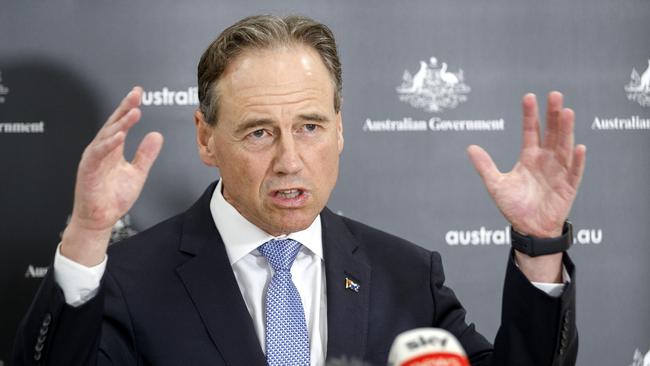Greg Hunt’s India ban highlights risk of outsourcing parliament powers

Parliament is meant to be the nation’s ultimate lawmaker. It has the legitimacy to make laws for the whole community because it is a representative body elected by the people. It also conducts its proceedings and debates in public, meaning that is always subject to scrutiny. The Constitution recognises this by vesting the legislative power of the commonwealth in our federal parliament.
Despite this, exceptions have arisen that permit laws to be made other than by parliament. Most importantly, parliament can delegate its lawmaking power to ministers in the executive government. This reflects the fact that parliament does not have the time to debate the detailed regulations often required to accompany its laws. Sometimes laws must also be made by ministers with urgency and decisiveness, especially at times of war and national crisis.
Delegated legislation made by the executive has grown enormously in volume and importance. Around half of all of Australia’s federal law has been made by delegates rather than by parliament. This amounts to more than 31,000 federal laws extending across every aspect of our society.
The High Court upheld the making of delegated legislation in 1931 in Dignan’s case. It permitted parliament to delegate its lawmaking authority to ministers on any subject within parliament’s power. However, the judges also suggested there were limits to this practice. Parliament cannot abdicate its powers of legislation and must retain a supervisory role.
Parliament retains oversight through its power of disallowance. Delegated legislation must be tabled in parliament, with each house then having an opportunity to strike down the law. This preserves the role of parliament as the nation’s ultimate lawmaker. The power of disallowance can give rise to fierce debates within parliament and acts as an important democratic check on executive power.
In recent years, it has become increasingly common for parliament to give up its power of disallowance. It does so by authorising ministers to make regulations and then specifying that these are not subject to parliamentary override. This approach has proved very attractive to governments, which can make extensive laws without the inconvenience of parliamentary scrutiny and without the media and community interest this brings. It can be an effective way of heading off public debate about contentious policy choices.
Parliament is responsible for removing itself from the process of making of delegated legislation. In doing so, it has transferred enormous power over some of the nation’s most important laws and policies from our elected representatives to the government of the day. Parliament’s willingness to erode its own powers reflects the fact that it is controlled by government through the party system. The reality of how power is exercised means it is rare to find instances of parliament prioritising its constitutional responsibilities over the political interests of the government of the day.
The sidelining of parliament and the growth of executive power has got out of hand. Fortunately, this is provoking a counterreaction from parliamentarians keen to reassert their responsibilities. The Senate Standing Committee for the Scrutiny of Delegated Legislation completed an inquiry in March into the exemption of delegated legislation from parliamentary oversight. Its report exposes the depth of the problem, including how the removal of parliamentary disallowance has become routine. In 2020, 1715 pieces of delegated legislation were tabled in parliament. Of these, 299, or nearly one in five, were exempt from disallowance.
Many of the measures parliament was prevented from disallowing involved matters of the highest community importance. The list includes strict border controls, increasing the federal government’s debt ceiling to $1.2 trillion and changing the Australian content obligations for commercial television broadcasters. A more recent example is the Health Minister’s determination under the Biosecurity Act that citizens re-entering Australia be jailed if they have travelled from India.
As the India travel ban demonstrates, ministerial lawmaking is prone to problems. It lacks the deliberation and public debate of parliament, and so can involve hasty overreactions and poorly thought out plans. Ministerial rules can also be imposed without compromise, which means they can fail to balance the interests at stake. It is not surprising that rules of this kind can lack community confidence.
The Senate committee has made a raft of sensible recommendations to improve the lawmaking process. It proposes that all delegated legislation be subject to parliamentary disallowance unless there are exceptional circumstances. Any claim to exceptional circumstances must be subject to rigorous scrutiny and only permitted in rare cases. These are sensible reforms that are urgently needed to halt the undermining of parliament’s lawmaking role. We must end the all too common practice of bypassing our elected representatives in making some of the nation’s most contentious laws.
George Williams is a Deputy Vice-Chancellor and Professor of Law at the University of NSW


The federal government has sensibly decided not to extend the threat of jail for Australians returning from India. This, though, should not be the end of the matter. The ban imposed by federal Health Minister Greg Hunt reveals deep problems with how laws are made during the pandemic. Australians are right to ask how a minister, at the stroke of a pen late one Friday evening, could subject citizens to imprisonment for returning home, without even the prospect of this being disallowed by parliament.